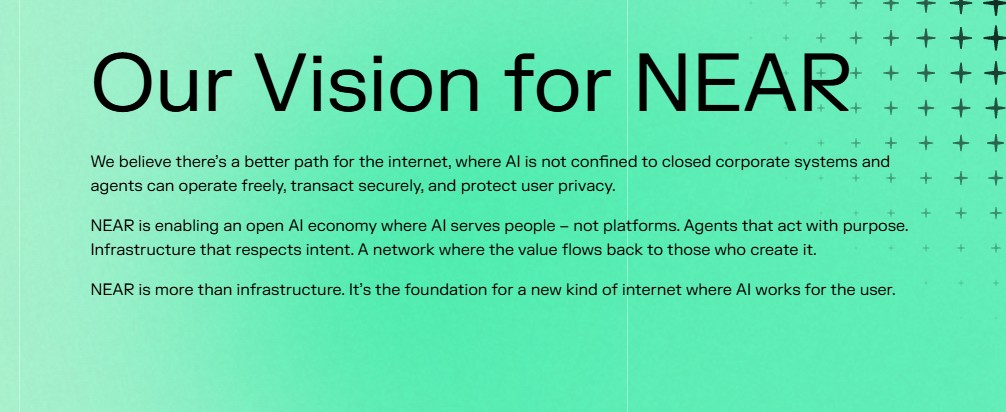Introduction
The NEAR Foundation is working on a new system called “artificial intelligence-powered digital twin delegates” to make voting processes in DAOs more efficient and participatory. This system consists of artificial intelligence agents that can vote on behalf of users, learning their thought patterns and preferences. The goal is to solve the problem of low participation in governance processes and make the decision-making mechanism faster, fairer, and more user focused. Technically, this system analyses users’ past voting behavior, interactions within the community, and their responses to specific questions to create a personal “digital twin.” This twin can vote on behalf of the user by modelling their values and decision-making style. Initially, these agents will only work at the level of providing advice and presenting ideas to the user. However, in later stages, the goal is for them to become fully autonomous delegates in sync with the user. Transparency and security are of paramount importance in this process. The NEAR Foundation is focusing on cryptographic verification systems that prove what data the models were trained on. It also emphasizes that critical decisions should not be voted on without human approval. Thus, the system is planned as an AI-supported governance model under human supervision, not a fully autonomous one.
Positive effects of the ecosystem
This development could have significant and transformative long-term effects on the NEAR ecosystem. First, digital twin delegates, which will step in on behalf of users who are unable to actively participate in voting processes due to reasons such as high workload, time constraints, or lack of technical knowledge, have the potential to significantly increase participation rates in DAOs. This could create a broader representation within the community, making decision-making processes more democratic, fair, and balanced. While in traditional DAO structures, a small minority typically votes actively, with the introduction of the digital twin system, the views of almost every member could be indirectly reflected in the voting.
Additionally, this system can provide significant speed and efficiency in decision-making processes. AI-powered delegates can contribute to more informed and consistent voting by offering decision recommendations based on users’ past preferences and interests. This can lead to an increase in knowledge-based decisions in governance and more qualitative discussions within the community. Especially in large DAOs, where decision-making processes can take days or even weeks, digital twins completing votes in seconds can accelerate the overall functioning of the system and shorten the implementation process of projects.
This system can also bring about a significant transformation in terms of interaction within the community. The recommendations offered by digital twins can encourage users to take a greater interest in governance issues. As long as users can see the reasons behind the decisions made by the artificial intelligence voting on their behalf, they will interact more with the system and feel a greater sense of belonging to the processes. As a result, the NEAR ecosystem can transform into a more participatory, active, and conscious community.
Negative effects of the ecosystem
On the other hand, certain risks also exist. Situations such as artificial intelligence failing to fully reflect the user, making incorrect decisions, or having its data manipulated can seriously undermine the system’s reliability. When a user’s values, mindset, or priorities are not modeled correctly, the AI delegate may make misguided decisions. This can create distrust at both the individual and community levels. In particular, incorrect decisions made on behalf of users in voting processes cast a shadow over the fair and transparent operation of the system. The possibility of data being manipulated by malicious individuals, the parameters used to train the AI being deliberately altered, or the system becoming vulnerable to external interference can threaten the integrity of the DAO governance model.
Furthermore, if the development and control of these delegates are concentrated in certain centers, this could undermine the decentralized structure, which is the fundamental principle of DAOs. If artificial intelligence systems remain under the control of only a few technical teams, institutions, or developer communities, the influence of certain interest groups in decision-making processes may increase. This weakens the spirit of democratic participation in the system and reduces trust within the community. A governance model that shifts towards a centralized structure may undermine the principle of “equal voice for everyone,” which is at the core of DAOs, by indirectly limiting the voice of community members.
Conclusion
As a result, the NEAR Foundation’s digital twin project stands out as one of the most notable innovations directly integrating artificial intelligence into blockchain governance. This initiative is seen not only as a technological experiment but also as a step with the potential to reshape the future of decentralized governance. The project aims to solve fundamental problems commonly seen in DAO ecosystems, such as low participation rates, lack of information, and inefficiency in decision-making processes. Digital twins, which can learn users’ preferences and values, can participate in voting on their behalf, enabling the formation of a more balanced, inclusive, and sustainable governance structure within the community.
If this system operates as planned, the NEAR protocol could become a pioneer in the industry not only through its technical infrastructure but also through innovations in its governance model. This could increase interest in the NEAR ecosystem, attract more developers and investors, and contribute to the ecosystem’s sustainable growth in the long term.
growth. Furthermore, AI-powered voting mechanisms could accelerate decision-making processes within the community, enable better analysis of user feedback, and make governance more dynamic.
Near is paving the way for a new era in both blockchain and artificial intelligence with its Digital Twin project. However, for this step to be successful, it is necessary to act with meticulous care in terms of technical security, ethical oversight, community communication, and the protection of user data. If NEAR can strike this balance and combine technology with community trust, this project could become a turning point that shapes not only the NEAR ecosystem but also the future of DAO governance in general.






